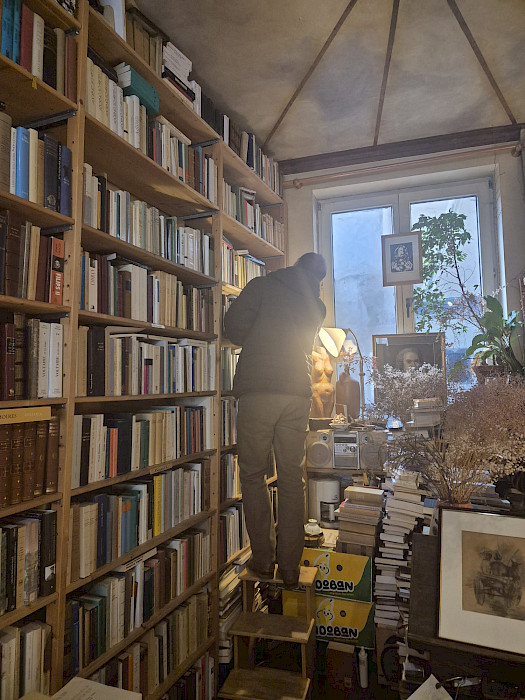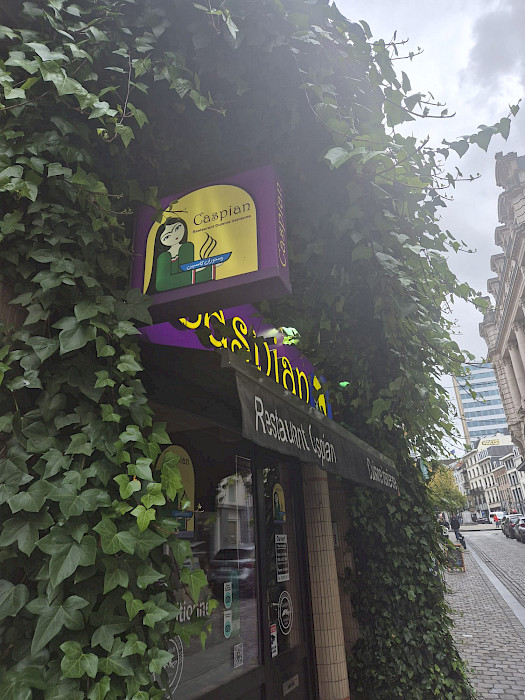between a writer and his translator – by Iulian Bocai (writer RO) artist-in-residence Passa Porta
The week before coming to Brussels, I had begun translating a book from German, describing daily life in contemporary Iran, by a German author with Persian roots. The character in charge of the narrative voice was visiting the country to meet the extended family and was in a state of descriptive awe, manifested in lengthy enumerations—from furniture to trees, clothes, and people, but especially dishes like sabsi and bademjan, that I had never heard of before, but made a mental note of to try at some point, if life were to ever push me through the doors of a Persian restaurant.
When I came to Brussels for Passa Porta I was mostly alone for the first week and wandered the streets of the city center a lot, from the Bourse to Egmont Park and back again—and in these strolls I did happen upon a Persian restaurant, only slightly predictably named The Caspian, with an expensive menu glued on the inside of the front window. I had also read in the German book that one does not eat Persian food alone, so I made another mental note: to bring Charlotte (van Rooden) there, once she came to Brussels. We were both to have an event in a few weeks—me very predictably talking about myself, and Charlotte about Romanian literature at large.
Impeded by the unfamiliar phonology, I didn’t remember my first mental note about sabsi and horme-sabsi, kuku-sabsi, and fesenjan, but I did remember my second one and brought Charlotte at The Caspian on the 21st. By this time, however, I had forgotten why I wanted to take her there in the first place—the German book mentioning Persian cuisine had totally slipped my mind. We had overpriced kebab and dhoogh in wine glasses—other dishes, more difficult to pronounce, happened to also be the most expensive. We hadn’t seen each other since the middle of summer and we talked this distance back for a while, looking at the days ahead.
Charlotte asked me what I was working on beside my next novel, and I told her that I was translating a book on Iran.
What book? she asked.
But I couldn’t remember the title and gave her a general description.
Is it Im Herzen der Katze by any chance?
Yeah, I think that’s the one.
What?!
What? Why are you surprised?
I am working on the same one! she almost shouted.
Only then did I remember that I had brought her there precisely because of this book. And I told her. So we sat staring for a while, at each other, or perhaps into the eyes of what seemed like an impossible coincidence. Here I was, in the heart of Brussels, eating in a Persian restaurant that I only came to with my Dutch translator because of a book that both of us were working on.
The kebab was really good—only drinking the doogh from wine glasses felt a little unusual.
It is coincidences like these that make the life of a prose writer meaningful. Or if this is too broad a generalization, let me offer it with added specificity: it is coincidences like these that make stories possible. Stories take events and place them in sequence, and writers hope they’ll stay together because they somehow fit. You rarely know whether everything fits before you get to the end of whatever you are writing—you have to write a great deal to get a sense of all the pieces coming together, and if at the end you feel that they don’t, a great deal of time has been wasted and there’s nothing you can do about it. If, however, you discover that they do, it’s almost always because of a sense of symmetry, of a subterranean coherence between scenes, symbols, choices, and ideas. What coincidence does is that it offers you a stronger case of that: it somehow promises inevitability. And inevitability is both disempowering—because it makes it seem like you don’t own your life as much as you would like— and beautifully poetic—because it creates the impression that sometimes you just vibe effortlessly to the tune of the world or that the labyrinth of time opens up and lets you catch a glimpse of its insides.
Charlotte and I have shared many moments of quiet friendship in the last four years—once we ate salami on bread watching a decadent shark attack movie at 10 p.m. in an almost deserted house in rural Romania; but this one was eerie. I was in Brussels mostly because of her and her infinite powers of persuasion—she’d translated my first book; we were in this restaurant because I was translating a book about a faraway world and a different way of life. She was translating the same book and there we were, staring blankly at this strange moment of kismet. We went out and kept talking about it, strolling just behind the Grote Markt—but coincidences almost never contain their own complete explanations. Then again, neither does friendship.

